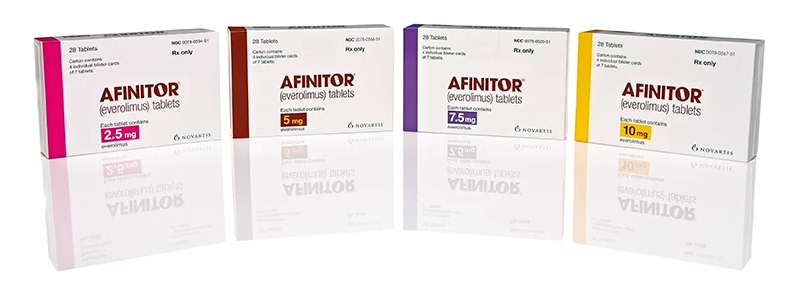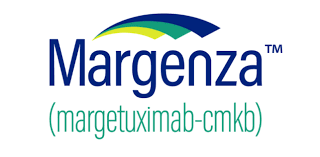Afinitor (everolimus) vs Margenza (margetuximab-cmkb)
Afinitor (everolimus) vs Margenza (margetuximab-cmkb)
Afinitor (everolimus) is an mTOR inhibitor used primarily to treat various types of cancers, such as advanced renal cell carcinoma, certain breast cancers, and neuroendocrine tumors, by interfering with cancer cell growth and proliferation. Margenza (margetuximab-cmkb), on the other hand, is a monoclonal antibody designed to target HER2-positive breast cancer, a specific type of tumor that overexpresses the HER2 protein, and it works by flagging cancer cells for destruction by the immune system. The choice between Afinitor and Margenza would depend on the specific type and characteristics of the cancer being treated, as well as the patient's overall health, previous treatments, and potential drug interactions, making it essential for a healthcare provider to determine the most appropriate option based on the individual patient's condition.
Difference between Afinitor and Margenza
| Metric | Afinitor (everolimus) | Margenza (margetuximab-cmkb) |
|---|---|---|
| Generic name | Everolimus | Margetuximab-cmkb |
| Indications | Advanced hormone receptor-positive, HER2-negative breast cancer in postmenopausal women; advanced renal cell carcinoma; renal angiomyolipoma and tuberous sclerosis complex; subependymal giant cell astrocytoma (SEGA) associated with tuberous sclerosis complex | Metastatic HER2-positive breast cancer in combination with chemotherapy |
| Mechanism of action | mTOR inhibitor, which inhibits the mammalian target of rapamycin (mTOR) pathway, a key signaling pathway that regulates cell growth, proliferation, and survival | Monoclonal antibody that targets the HER2/neu receptor, leading to immune-mediated destruction of cancer cells |
| Brand names | Afinitor, Afinitor Disperz, Zortress | Margenza |
| Administrative route | Oral | Intravenous |
| Side effects | Mouth ulcers, infections, rash, fatigue, diarrhea, decreased appetite, edema, stomach pain, cough, headache, decreased weight, and taste disturbance | Infusion-related reactions, fatigue, nausea, diarrhea, vomiting, constipation, headache, fever, hair loss, abdominal pain, and extremity pain |
| Contraindications | Hypersensitivity to everolimus or other rapamycin derivatives | Hypersensitivity to margetuximab-cmkb or its excipients |
| Drug class | mTOR inhibitor | Monoclonal antibody |
| Manufacturer | Novartis Pharmaceuticals Corporation | MacroGenics, Inc. |
Efficacy
Afinitor (Everolimus) Efficacy in Breast Cancer
Afinitor (everolimus) is an mTOR inhibitor that has been approved for use in hormone receptor-positive, HER2-negative breast cancer. This medication is typically used in combination with exemestane after the failure of treatment with letrozole or anastrozole. Clinical trials have demonstrated that the addition of everolimus to exemestane therapy significantly extends progression-free survival compared to exemestane alone. However, it is important to note that while Afinitor has been shown to delay the progression of the disease, an improvement in overall survival has not been definitively established.
The efficacy of Afinitor was notably demonstrated in the BOLERO-2 clinical trial, where patients receiving the combination of everolimus and exemestane had a median progression-free survival of 7.8 months, compared to 3.2 months in patients receiving placebo and exemestane. This represents a significant improvement in the management of advanced breast cancer, particularly for patients who have become resistant to other hormonal therapies.
Margenza (Margetuximab-cmkb) Efficacy in Breast Cancer
Margenza (margetuximab-cmkb) is a monoclonal antibody designed for the treatment of patients with metastatic HER2-positive breast cancer who have previously received two or more prior anti-HER2 regimens, at least one of which was for metastatic disease. Margenza, in combination with chemotherapy, has been shown to improve progression-free survival in this patient population. The approval of Margenza was based on results from the SOPHIA study, which compared margetuximab plus chemotherapy to trastuzumab plus chemotherapy.
In the SOPHIA trial, patients treated with Margenza and chemotherapy experienced a median progression-free survival of 5.8 months, compared to 4.9 months for patients treated with trastuzumab and chemotherapy. While the improvement in progression-free survival was modest, Margenza offers an additional treatment option for patients with limited therapies available due to the refractory nature of their disease. The overall survival benefit, while not statistically significant at the time of interim analysis, showed a positive trend and continued to be evaluated.
Regulatory Agency Approvals
Afinitor
-
European Medical Agency (EMA), European Union

-
Food and Drug Administration (FDA), USA

-
Health Canada

-
Pharmaceuticals and Medical Devices Agency (PMDA), Japan

-
Therapeutic Goods Administration (TGA), Australia

Margenza
-
Food and Drug Administration (FDA), USA

Access Afinitor or Margenza today
If Afinitor or Margenza are not approved or available in your country (e.g. due to supply issues), you can access them via Everyone.org.
How it works

Make an enquiry
Choose the medicine you want to buy, answer a couple of questions, and upload your prescription to speed things up. We’ll get back to you within 24 hours.


Make an enquiry
Choose the medicine you want to buy, answer a couple of questions, and upload your prescription to speed things up. We’ll get back to you within 24 hours.


Breeze through the paperwork
We'll guide you through the required documents for importing unapproved medicine, ensuring you have all the necessary information.


Get a personalized quote
We’ll prepare a quote for you, including medicine costs and any shipping, administrative, or import fees that may apply.


Receive your medicine
Accept the quote and we’ll handle the rest - sourcing and safely delivering your medicine.

Some text on this page has been automatically generated. Speak to your physician before you start a new treatment or medication.
Let's talk
If you have any questions, call us or send us a message through WhatsApp or email:
Contact us




